Book review: Children of Dune
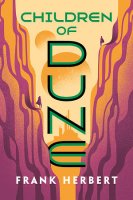
Book: Children of Dune
Note: I can't write about this title without spoilers from the previous ones, so jump directly to the last paragraph if you wish to avoid them.
The third book of the Dune series, Children of Dune happens 9 years after Dune: Messiah. Blind and no longer with premonition powers, Paul went to the desert to die. His sister Alia is now in command, but something is not going well, both inside her and in the imperium. Plots and conspirators are everywhere. Dune is now advanced in the terraforming efforts, with some areas quite green, rains, and Fremen are starting to become used to water no longer being a scarce resource.
Paul and Chani twins, Leto II and Ghanima are 9-year-olds with an incredible intelligence, fully aware that something is amiss with Alia, and that they must do something to regarding their aunt, the Atreides empire, and maybe even Arrakis.
This book switches the main protagonist obviously from Paul to his family. We will learn about Alia's "issues", but the real main characters are the twins. This book also departs a lot from a "mild" sci-fi setting (worms, ghoulas and prescient powers aside), to fully embrace the fiction part. Without spoiling much, the premonition and inner voices powers that both Alia and Paul's children have go way further than the powers that Paul had, and there will be other plot twists and events that will surprise you.
The first half of the book is relatively calm, pretty much focused on politics, conspiracies and developing the characters. But, once you pass the first, half it jumps into a series of events that made me spend some long night sessions reading on and on, wanting to know what would happen next. Definitely more science-fiction than the previous titles, and, in my opinion, highly recommended.
Tags: Books
Comic Book review: Dune: The Graphic Novel books 1 & 2
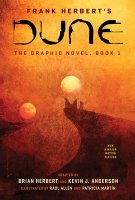
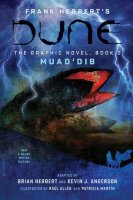
Books: Dune: The Graphic Novel Book 1 & Dune: The Graphic Novel Book 2
Continuing my desire for more Dune content, after the first two books and watching the movies (and now going to watch 2024's Dune Part Two), I recently discovered that there were some graphic novels based on the books; Two already published, and a third one coming mid 2024. What I did not know is that each graphic novel covers one third of the book... so be aware of that detail.
The writing is mostly directly taken from the book, so many dialogues are 1:1 matches. It sticks very close to the original content, so excepting a tiny change here and there, most of it has been ported entirely. Brian Herbert is listed as one of the authors, so that's probably why it is so accurate.
Where you will see some differences is in the visual style. After having two movies, many videogames and concept art/drawings, I at least have my image formed of certain aspects, like the Ornithopters, the Harvesters, even how the Harkonnen look (pale, bigger than normal humans, with dark clothing...). The style adopted by the illustrators is not bad, but reminds me more of the 1984 David Lynch's film than the other pre-existing materials, and sometimes feels not too elaborated; for example the Harkonnens look the same as the Atreides, and even the Baron is not very imposing. Don't get me wrong, it is not bad, just that the visual style didn't click with me.
Interesting additional material, but I'd go read the book instead. In any case, I will grab the third and last graphic novel book when comes out, and see how the more action-packed part is depicted.
Tags: Comic Book
Book review: Siege of Terra: The End and the Death: Volume III
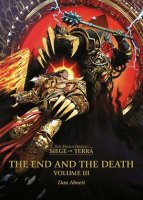
Book: Siege of Terra: The End and the Death: Volume III
And here we are, the third and last volume of the last book in the Siege of Terra series, which also represents the last book in The Horus Heresy series. Quite an ending, and most probably also the main reason why splitting in three the final arc of all "Warhammer 30,000" arcs.
As I expected, this title delivers way more of everything: more action, more events, more questions [1]... But we finally get all the myriad story arcs closed at once, some better than others; and, sadly, a few too dull/dry, after so many things have happened, to close certain plots in just a few paragraphs feels... unsatisfying.
But focusing on the main topic of the book, the battle between Horus and The Emperor delivers what you'd expect. It has many stages, and a few of them are a bit bizarre or not of my liking [2], but in general is energetic and exciting, with some twists here and there, despite the end being well known.
The writing is, as usual with Dan Abnett, very good, although I can now confirm that the three volumes contain too many synonyms and adjectives and at times excessively decorated sentences, that I grew tired of checking in the dictionary what some of them meant [3]. Using esoteric words to me does not make a book better, just more complex to read.
Despite the flaws, I'm happy with the read, I don't regret the purchases, and I recommend their reading for anyone wanting to get a vastly longer description of how the Horus Heresy finished.
[1] I don't want to spoil the contents, but certain actions leave questions unanswered (on purpose, of course)
[2] When they decide to play a kind of Magic: The Gathering with custom tarot card decks... 😬
[3] Funnily, My ebook reader's dictionary couldn't find a few of them.
Tags: Books
Status Update: February 2024
Finished
Cyberpunk 2077: Phantom Liberty
I was not sure if to buy the only expansion that CP2077 was going to have, but some early comments were hinting at many really main game improvements, plus of course compelling new expansion content, and I decided to give it a try. I can't recommend enough to play the game with the expansion; The 2.0 game patch fixed so many issues and reworked core systems like combat, crafting, the skill trees, vehicle driving, police system... Everything works way better now, way more like you would expect from the original game.
And the expansion blends in perfectly with the main game. Most of its content is in a previously closed area, but a few quests and mechanics "go outside". Fantastic voice acting and music, great 3D modelling and new maps... everything is as high quality as the main game, allowing you now to have 5 different endings (one is secret).
I went on and started from scratch a new game, and unlocked 3 more endings. In fact, I unlocked all achievements with the except of the secret ending, which requires an early expansion decision and I wasn't willing to replay a third time most of the game... for now.
Deus Ex: Human Revolution - Director's Cut
I got the Director's Cut version in a sale. It required some tweaks due to being a frankenstein-mixture of the normal PC version and the Wii U port, but after the tweaking, I enjoyed a pleasant and flawless experience, including the DLC episode (not too badly injected in the main story). The game maps feel tiny now in comparison with open worlds (and makes you like even more Cyberpunk 2077), but the variety of choices are still great.
Ongoing
Dragon Age: Origins
Not much news, it's costing me a bit to advance, as I remember fragments of the quests and story from the past. But for now, I haven't given up.
Dwarf Fortress
One of the main reasons why Dragon Age does not advance 😃. I decided it was time to get it this xmas... and oh boy, such an incredible and complex game (at equal parts). Everything feels like an adventure on itself, but the learning curve is also so steep that I spend half of the time searching and reading how to do X or Y.
It is the ultimate micro-management procedural game, but I miss more in-game tutorials or explanations. Still, I think is remarkable the level of detail you find everywhere, from combat to humanoid and animal personalities, and the events that happen. I like a lot the 2D pixel-art graphics, but the main thing stopping me in the past from trying the ASCII version was the keyboard-based UI, and the Steam version is quite good (not perfect, but probably due to how complex the game systems are).
As I gather information and read guides and find tools, I thought would be nice to keep track of them, so I've added a dedicated Dwarf Fortress page to the blog.
Postponed / Discarded
Starfield
This game is a poor Fallout-in-space. Without other cool space shooters, Mass Effect and No Man's Sky, it would have been good, but comparisons are inevitable, and it fails at every single one of them.
So I'll just wait until either the company improves it a lot, or mods get good enough.
Tags: Videogames
Book review: Siege of Terra: The End and the Death: Volume II
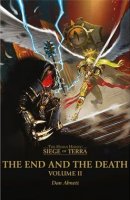
Book: Siege of Terra: The End and the Death: Volume II
I gave myself as a Christmas present the newly released volume 2 of The End and the Death, and just finished reading it. This will be a shorter review because, as I was fearing, there will be a third and final volume, so this middle book advances the story but, excepting two specific events, really not that much. I will only mention one of the exceptions because it is already known, the other is left for the book readers to find out.
With more than 500 pages, I feel that in this case we have an artificially elongated storyline. Yes, all the plots, subplots and minor things kind of progress, but for some of them it is so minimal, or so dull and uninteresting, that I stand firm on my opinion about some of them being redundant and better off. Also, in this book there are so many jumps between the groups of characters, that if each had a chapter we would be talking about probably more than a hundred! Some of the micro-chapters are just two or three pages long, which feels almost confusing, and transforms what could be cliffhangers into mere annoyances.
There are excellent chunks of content, like the Horus vs Sanguinius battle, which we all know how it ends, but still feels exciting at first and then sad (this book actually ends just after the moment that Horus kills the primarch). There are some very interesting reveals around the Emperor, some of which would be very cool to use in future campaigns or books. And I also enjoyed Ahriman, as it provides a view of a sorcerer thirsty for knowledge, instead of a classic "bad guy appears and kills all poor non-astartes humans".
Not a bad read, but I expected either to wrap up the story, or to provide enough quality content to make up for a third volume. And the book does not provide the first, and falls short on the second. I recommend to wait for the third title and then read them together.
Tags: Books